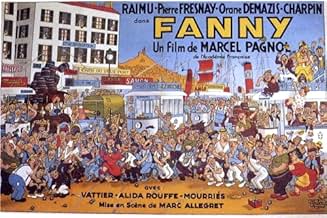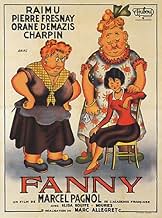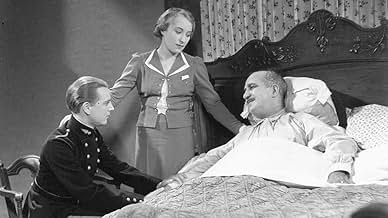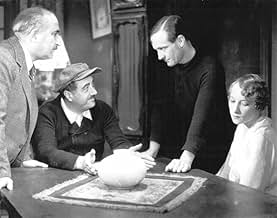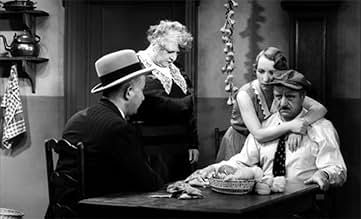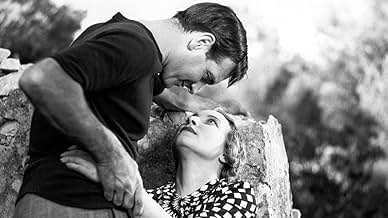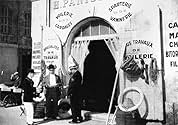IMDb-BEWERTUNG
7,8/10
2060
IHRE BEWERTUNG
Füge eine Handlung in deiner Sprache hinzuAfter Fanny's boyfriend leaves her and sails away, she finds out she's pregnant.After Fanny's boyfriend leaves her and sails away, she finds out she's pregnant.After Fanny's boyfriend leaves her and sails away, she finds out she's pregnant.
Fernand Charpin
- Honore Panisse
- (as Charpin)
Auguste Mouriès
- Félix Escartefigue
- (as Mouriès)
Robert Vattier
- Albert Brun
- (as Vattier)
Édouard Delmont
- Dr. Felicien Venelle
- (Nicht genannt)
Pierre Prévert
- Un voyageur du tramway
- (Nicht genannt)
Annie Toinon
- Amélie
- (Nicht genannt)
Empfohlene Bewertungen
"Fanny", the second chapter of Marcel Pagnol's 'Marseilles' trilogy, takes us right to the spot the first movie ended. There's no summary, no flashbacks, no flash forward either, it's just as if the director, Marc Allegret trusted the good memory of his audience, and I guess in these times, cinema was still such a new thing that an experience like the first "Marius" would have left unforgettable memories.
Marius (Pierre Fresnay), the idealistic and romantic son of colorful barkeeper César (the one and only Raimu), has just sailed to the seven seas, following both his lifelong dream and the guidance of his beloved Fanny (Orane Demazis). We left César delighted after hearing that his son and Fanny would marry, and give him grandchildren in the years to come. But "Fanny" starts with Marius' departure. And you can see the light of joy vanish from César's face, he welcomes the news like a knife in his heart and sinks into melancholy like an ice cube in a Pastis drink. The first act shows both César and Fanny trying to deal with Marius' absence, their deep and inconsolable sorrow makes Marius the most present character despite his absence.
But the worst is yet to come, Fanny is pregnant and Marius is the father. Her mother Honorine throws a tantrum and was about to disown her when she passed out, that's the kind of blow to their honor they don't need in the family. The situation seems unsolvable but there's a gateway: brave old Panisse (Henri Charpin) who's still maintaining his offer to marry Fanny. What I liked about the film is that you kind of secrecy to run in the narrative, but it doesn't, for one simple reason, this is a film with fully developed characters. Their personality are not reliant on the plot, they make the plot. Fanny is not a bad woman, when Panisse proposes her, she can't hide her pregnancy, because lying would be more dishonorable. And I loved Panisse's response, he's aware that their age gap will inspire a lot of gossipy talks, but he's always wanted to be a father, so his marriage with Fanny is benefiting for both, it's a win-win situation.
Any ounce of guilt or discomfort is dissipated; by marrying Fanny, Panisse keeps her honor and his self-esteem.. It is a marriage of convenience but Panisse makes good points, what's more, he's rich, so Fanny doesn't have much a choice, between a bastard and a rich heir. But here 's how the film teases your expectations again, just when you're wondering how they'll keep the secret, César does his best keeping Fanny's spirit up confident that Marius will come back, and does his best keeping Panisse away from her, dismissing his idea of marrying her. In a lesser movie, Fanny would have held the truth and César would have called her as a whore or a venal woman, but Fanny can't stand the insult and asks Panisse to reveal their secret. It takes a few minutes but César realizes they do have a point and waiting for Marius would bring dishonor for poor Fanny. But he also looks at the bright side of things, he'll still have a grandson and a heir, the name doesn't matter, he'd be twice wealthier.
There's a poignant scene where the older man of Panisse family thanks Fanny for the baby and at this point, there's no way you'd believe they did something wrong. It is a win-win indeed and a fragile equilibrium is reached until Marius comes back. And again, Fanny tells him the truth Panisse can let Fanny go back to Marius but he won't abandon his child and even César, César who had always put his son above any other man, who had a nasty quarrel with Panisse, defended him. What a climax! You have plenty of characters with desires and dreams colliding together, Marius' love for Fanny, Fanny's honor, Panisse needing a child, César for a grandson to play with, each one is right, but they can't all be satisfied, even Fanny can't abandon Panisse despite the fact that she loves Marius. It's pure Cornelian dilemmas and it works on a very emotional and realistic level, not resorting to the clichés or "idiot script" formula where it's more convenient to keep a mystery, the film doesn't care for mysteries, it cares about people who're so passionate, so involved that they end up knowing what the others were about to hide. Like life I guess, you can't have secrets for too long.
The film was directed by another director but the continuity with the first film is so well-done you'd think it was made by the same person. Well, the film is based on Marcel Pagnol's play and he's the real "director" and the actors are so into their characters that they make any directorial stunt unnecessary, it's a character-study, a story of people driven to the most extreme compromises by their morals, feelings and duties, to keep the appearances. The film ends with its bleak note, leaving us eager to look forward to a suitable conclusion, this time named "César" and directed by Marcel Pagnol himself.
Needless to say, I'm looking forward to discovering it
Marius (Pierre Fresnay), the idealistic and romantic son of colorful barkeeper César (the one and only Raimu), has just sailed to the seven seas, following both his lifelong dream and the guidance of his beloved Fanny (Orane Demazis). We left César delighted after hearing that his son and Fanny would marry, and give him grandchildren in the years to come. But "Fanny" starts with Marius' departure. And you can see the light of joy vanish from César's face, he welcomes the news like a knife in his heart and sinks into melancholy like an ice cube in a Pastis drink. The first act shows both César and Fanny trying to deal with Marius' absence, their deep and inconsolable sorrow makes Marius the most present character despite his absence.
But the worst is yet to come, Fanny is pregnant and Marius is the father. Her mother Honorine throws a tantrum and was about to disown her when she passed out, that's the kind of blow to their honor they don't need in the family. The situation seems unsolvable but there's a gateway: brave old Panisse (Henri Charpin) who's still maintaining his offer to marry Fanny. What I liked about the film is that you kind of secrecy to run in the narrative, but it doesn't, for one simple reason, this is a film with fully developed characters. Their personality are not reliant on the plot, they make the plot. Fanny is not a bad woman, when Panisse proposes her, she can't hide her pregnancy, because lying would be more dishonorable. And I loved Panisse's response, he's aware that their age gap will inspire a lot of gossipy talks, but he's always wanted to be a father, so his marriage with Fanny is benefiting for both, it's a win-win situation.
Any ounce of guilt or discomfort is dissipated; by marrying Fanny, Panisse keeps her honor and his self-esteem.. It is a marriage of convenience but Panisse makes good points, what's more, he's rich, so Fanny doesn't have much a choice, between a bastard and a rich heir. But here 's how the film teases your expectations again, just when you're wondering how they'll keep the secret, César does his best keeping Fanny's spirit up confident that Marius will come back, and does his best keeping Panisse away from her, dismissing his idea of marrying her. In a lesser movie, Fanny would have held the truth and César would have called her as a whore or a venal woman, but Fanny can't stand the insult and asks Panisse to reveal their secret. It takes a few minutes but César realizes they do have a point and waiting for Marius would bring dishonor for poor Fanny. But he also looks at the bright side of things, he'll still have a grandson and a heir, the name doesn't matter, he'd be twice wealthier.
There's a poignant scene where the older man of Panisse family thanks Fanny for the baby and at this point, there's no way you'd believe they did something wrong. It is a win-win indeed and a fragile equilibrium is reached until Marius comes back. And again, Fanny tells him the truth Panisse can let Fanny go back to Marius but he won't abandon his child and even César, César who had always put his son above any other man, who had a nasty quarrel with Panisse, defended him. What a climax! You have plenty of characters with desires and dreams colliding together, Marius' love for Fanny, Fanny's honor, Panisse needing a child, César for a grandson to play with, each one is right, but they can't all be satisfied, even Fanny can't abandon Panisse despite the fact that she loves Marius. It's pure Cornelian dilemmas and it works on a very emotional and realistic level, not resorting to the clichés or "idiot script" formula where it's more convenient to keep a mystery, the film doesn't care for mysteries, it cares about people who're so passionate, so involved that they end up knowing what the others were about to hide. Like life I guess, you can't have secrets for too long.
The film was directed by another director but the continuity with the first film is so well-done you'd think it was made by the same person. Well, the film is based on Marcel Pagnol's play and he's the real "director" and the actors are so into their characters that they make any directorial stunt unnecessary, it's a character-study, a story of people driven to the most extreme compromises by their morals, feelings and duties, to keep the appearances. The film ends with its bleak note, leaving us eager to look forward to a suitable conclusion, this time named "César" and directed by Marcel Pagnol himself.
Needless to say, I'm looking forward to discovering it
Part the Second of this trilogy reminds us that at heart it is pure melodrama and if not quite 'dead! and never called me mother', it is certainly from the same stable. Arguably Orane Demazis - replicating here, as indeed are all the principals, her stage role as the eponymous seduced and abandoned and slightly enceinte ingenue - is the weakest link in an unusually strong chain yet even then with the handicap of being saddled with a role that today would be risible (I doubt if it is possible to 'SPOIL' a classic which is now some 72 years old so suffice it to say that as a result of 'giving herself' to Marius, shortly before he ships out on an extended cruise, Fanny finds herself in an 'interesting' position and must make some tough choices. Today, of course, it is practically an honor to fall pregnant with no father material in sight and a State standing by to cosset the resulting infant from cradle to grave but in 1932 the resulting 'shame' embraced not only the mother-to-be but also her family) she manages to elicit our compassion and keep our humor at bay. Pedants will have a field day with the dodgy arithmetic - Marius has supposedly signed up for a five-year voyage yet on his return Fanny's son is a mere 10 months old - but what matters is the acting-plus-believability factor and here, thanks as always to the great Raimu, aided and abetted by Fernand Charpin, Alida Rouffe and Milly Mathis they bring it off to a fare-thee-well. Pierre Fresnay as Marius does little more than play the fly-in-the-ointment in the closing quarter of the movie and may well have been looking ahead one full decade to 'Le Corbeau'. Building on the first part and moving seamlessly to the next stage this is a worthy successor to 'Marius'. 9/10
Part two of Marcel Pagnol's wonderfully simple, but, mind me, not simple-minded Marseilles trilogy is even funnier and more touching than its predecessor, thanks to expanded supporting roles and a broader variety of outdoor locations.
The dialogue is as humorously and emotionally rich as ever and the cast, almost outshone by Raimu's terrific performance, works wonders with their lines.
The pace may drag slightly from time to time and some story aspects feel redundant, but the basic concerns of Pagnol's deeply philanthropic approach to issues like paternal love, social constraints and diverging attitudes towards life offer more than enough pleasures.
8 out of 10 suspicious premature births
The dialogue is as humorously and emotionally rich as ever and the cast, almost outshone by Raimu's terrific performance, works wonders with their lines.
The pace may drag slightly from time to time and some story aspects feel redundant, but the basic concerns of Pagnol's deeply philanthropic approach to issues like paternal love, social constraints and diverging attitudes towards life offer more than enough pleasures.
8 out of 10 suspicious premature births
The sequel to "Marius" the year before stays in the same vein and is the same kind of staged theatre all the way, with the same kind of virtuoso performances by all the actors, but there is another director, and you miss the Alexander Korda flamboyance and liberal sweeps and flow of the movie tempo. This film is more like chamber theatre all the way, and you don't even see much of the harbour, the glorious ships, the street life and the joints. Fanny, left alone and pregnant by Marius going to sea for five years, marries another older suitor, just to give her child a future and safe environment, and it works out well, until Marius comes back after only two years as a most unsuspected surprise and does his best to complicate things but immediately leaves again. The story isn't much, it is very inferior to the first part, but there is a third part four years later, which will show the end of the story, directed by Marcel Pagnol, the author, himself - he made many films besides being a prolific Provence writer.
If you can get by the first fifteen minutes, get into the leisurely pacing and that fact that nothing is going to explode and no one shoots anybody or stabs anyone in the eye, and the film is about learning to live with other human beings, about being a parent, about falling and staying in love, perhaps you'll come to love this film, too.
The trilogy is set in another time long gone--Marseilles, a provincial fishing village, where Cesar and his son operate a sort of bar where locals drift in and out and play cards; a pretty young woman sells seafood outside, and she's known son Marius since they were children. Enough said: except that the acting is amazingly naturalistic for a 1930's film, that the performance by famed French entertainer Raimu is beyond words, is simply astounding in his range of emotions, his understanding of the human condition. This understated drama is a quiet masterpiece.
The trilogy is set in another time long gone--Marseilles, a provincial fishing village, where Cesar and his son operate a sort of bar where locals drift in and out and play cards; a pretty young woman sells seafood outside, and she's known son Marius since they were children. Enough said: except that the acting is amazingly naturalistic for a 1930's film, that the performance by famed French entertainer Raimu is beyond words, is simply astounding in his range of emotions, his understanding of the human condition. This understated drama is a quiet masterpiece.
Wusstest du schon
- WissenswertesFamed restaurateur and founder of California cuisine, Alice Waters, was so taken with the Fanny trilogy that she named her Berkeley restaurant Chez Panisse. The café upstairs from the restaurant is decorated with posters from the films Marius, Fanny, and César. Waters also named her own daughter Fanny and opened a small breakfast café in Berkeley called "Café Fanny" in 1984 which closed in March 2012.
- VerbindungenEdited into Geschichte(n) des Kinos: Une histoire seule (1989)
Top-Auswahl
Melde dich zum Bewerten an und greife auf die Watchlist für personalisierte Empfehlungen zu.
- How long is Fanny?Powered by Alexa
Details
Box Office
- Bruttoertrag in den USA und Kanada
- 8.262 $
- Eröffnungswochenende in den USA und in Kanada
- 7.720 $
- 8. Jan. 2017
- Weltweiter Bruttoertrag
- 8.262 $
- Laufzeit
- 2 Std. 20 Min.(140 min)
- Farbe
- Seitenverhältnis
- 1.20 : 1
Zu dieser Seite beitragen
Bearbeitung vorschlagen oder fehlenden Inhalt hinzufügen

